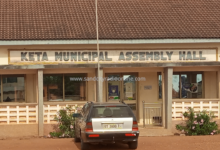
COVID-19: GES issues guidelines on school reopening
The Ghana Education Service (GES) has come out with the guidelines for the reopening of schools.
Dubbed: Guidelines for School Reopening During COVID-19, the guidelines are part of the measures put in place by the government to ensure that all educational institutions are safe for teaching and learning.
With the guidelines, which have been circulated across the country on various social media platforms, the GES seeks to promote the observance of all the protocols of the COVID-19 to make schools safe for learners, staff and educational workers.
“I want to assure all stakeholders, including parents and guardians, of our preparedness to support the provision of good quality education for all our learners, even in these times of the COVID-19.
“Our goal, in these times, is to provide quality education within a healthy and safe environment. At the same time, we will continue to build a more resilient educational system that will ensure continuous learning for our learners, even during emergencies,” the Director-General of the GES, Professor Kwasi Opoku-Amankwa, said in the guidelines.
Purpose
The guidelines said Ghana’s determination to beat the virus was guided by science and the evidence available.
“As we prepare to reopen our schools to allow learners to continue with their academic work, it is important that we establish broad guidelines for the safe operation of our schools,” it added.
“These guidelines are to help regional and district directors of education, as well as heads of schools, to operate safely in the country. It is important to note that the broad guidelines outlined in this document are a general guide and must be adapted, where necessary, to meet the peculiar situation of each region, district or school, in accordance with the protocols and directives for the reopening of schools,” it said.
It also sought to provide clear and concrete steps for safe operations through the prevention, early detection and control of the COVID-19 in schools and other educational facilities.
It said if done well, maintaining safe school operations during the reopening period and beyond could promote public health.
Fundamental principles
The goal of the GES, it said, was to ensure that learners, teaching and non-teaching staff were safe in school.
To help stop the spread of the disease, it cautioned learners, teachers and other staff who were sick or felt sick to stay at home and not go to school.
It charged schools to enforce regular hand-washing with soap under running water, use alcohol-based hand sanitiser and regularly disinfect and clean school surfaces such as door handles, tables and chairs.
Moreover, it said schools should enforce the wearing of face masks at all times, promote social distancing during school gatherings (assembly and worship sessions) and dining sessions.
The document said all schools were expected to be disinfected prior to the arrival of learners and staff, and that educational directorates were to ensure that their facilities were disinfected.
Facilities
It said schools would be provided with hand-washing facilities and hand sanitiser, and that school heads were to liaise with district and regional directors for their facilities.
“Learners and staff will be provided with re-usable face masks which must be worn at all times to, in and from school. Learners with hearing impairment and staff will be provided with age-appropriate face shields to be worn at all times and supported by staff for safe-keeping and cleaning,” it said.
Besides, house mothers, caregivers and teachers must regularly inspect the face shields, while gloves would be supplied to caregivers/house mothers/attendants for schools for learners with intellectual and developmental disabilities (IDDs), it said.
Class size
On class size for basic and senior high schools, the document said district directors and heads of schools should use their discretion to address peculiar situations in their districts and schools.
“Lesson periods and breaks shall be as stipulated by the GES and subject to the approved COVID-19 safety protocols.
“Visits to washrooms (that is, toilets and urinals) should be regulated to promote social distancing and safety. Parents are encouraged to provide their children with food (e.g. snacks) when going to school to minimise the movement of learners for food within and outside of the school premises,” it said.
For kindergarten children, it said heads of schools must ensure regular disinfection of furniture and other teaching/learning resources, as well as the regular washing of hands with soap under running water.
Source: Graphic Online






